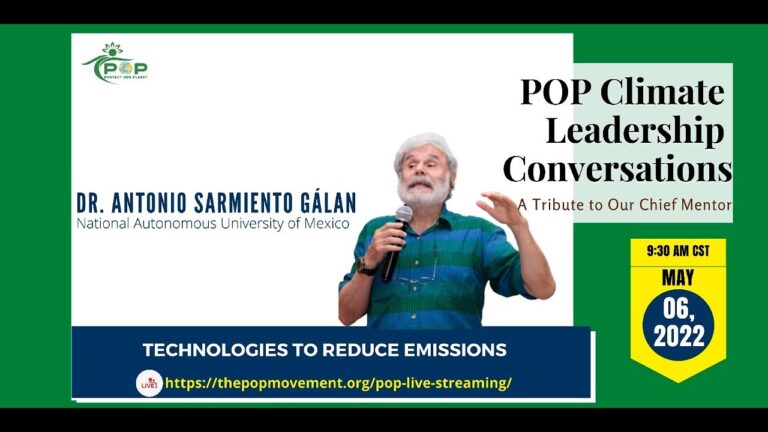
- This event has passed.
TECHNOLOGIES TO REDUCE CARBON EMISSIONS BY DR. ANTONIO SARMIENTO GALAN
May 6, 2022 @ 8:00 am - 5:00 pm

On May 06, 2022, the POP Movement was pleased to have an eye-opening conversation with Dr. Antonio Sarmiento Gálan is a member of the Instituto de Matmáticas of the Universidad Nacional Autónoma de México since 1999. Prior to his current appointment, he worked at the Instituto de Astronomía at México for 18 years.
Antonio has been interested in regional impacts of global warming since 2005. He offers a lecture course on anthropogenic global warming at the Universidad Nacional Autónoma de México for undergraduate and graduate students. He also coordinates the Technical Committee on Energy and Global Warming at the Advisory State Council on Sustainability for the State of Morelos, México.
The senior mentor of the POP Movement, Dr. Ash Pachauri wanted to understand Dr. Antonio’s perspective on leadership to which he emphasized in his response to the ability to conduct tasks, form ideas, and prepare for the future. Dr. Antonio summed it up as a position that enables people to understand the “It’s easier said than done”.
Ivan Ransom from Mexico talked about the existing technologies of a low-emissions future and the need for these technologies to be widely implemented. He wanted to know how “green premiums” can be lowered or diminished as has been done in renewable energy production to which Dr. Antonio brought in Bhutan as an example. Bhutan has implemented a real plastic ban and has net negative emissions despite being surrounded by many capitalist countries. Dr. Antonio spoke about the fossil fuel empire and the pressure put by oil and gas companies to limit renewables. Antonio also spoke about different studies that show that hydroelectric power, solar, and wind could supply the world demand and that the US will have 95% of the technology to produce 100% renewable energy by 2025. Antonio also mentioned that studies have shown that it would cost less to transition old coal plants to renewable energy than to leave them operating.
Kevin Munstermann from Mexico asked about how developed countries with the latest technologies can work hand in hand with developing countries to make sure their transition to lower-emission technologies are faster and more widely accepted. Dr. Antonio spoke about the health impact of air pollution and climate change which killed over three times more people than COVID-19 did in 2020.
Edgar Martinez from Mexico wanted to know how the implementation of these technologies could have a positive impact on the livelihoods of people living in developing countries, especially in the short term. Dr. Antonio expressed the existence of unbalanced responsibilities and the necessity for the global north to help the global south. He also talked about how poor countries have got into great debt trying to recover from the effects of climate change and some nations are already spending 20% of their budgets on interests.
Ana Hanhausen from Mexico asked a question on youths’ role in promoting a quicker transition, the voice and opinion that youth have in implementing these technologies. Dr. Antonio talked about the important responsibility that youth leaders will soon have in choosing a country representative. Youth leaders can get involved in learning about their countries politics and methods in order to demand better policies for a safer and more sustainable future.




